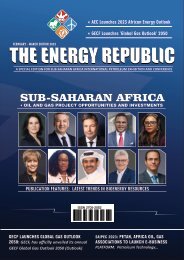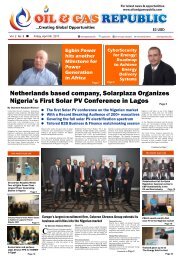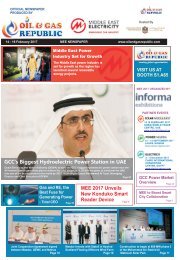OGR July - August Edition 2020
This publication provides latest stories in Africa, COVID-19 Pandemic in Africa, and key recommendation from industry experts on how Africa can navigate through the global pandemic.
This publication provides latest stories in Africa, COVID-19 Pandemic in Africa, and key recommendation from industry experts on how Africa can navigate through the global pandemic.
You also want an ePaper? Increase the reach of your titles
YUMPU automatically turns print PDFs into web optimized ePapers that Google loves.
APPO INTERVIEW
These facilities are very capital intensive.
We need to be able to come together and
have refineries and pipelines that can
transport products across borders. What
we are trying to do at APPO is to ensure we
have the cross-border infrastructure and to
do this, we need to pool our resources.
Question: Despite the need for energy in
Africa, much of its petroleum is exported to
non-African markets. Could that change?
Answer: This is a part of Africa’s colonial
legacy. When you go to many African
countries, you see railways running from
the hinterland to the coast. The railways
take agricultural and mineral resources
from where they are produced in the
hinterland to the ports to be exported
outside Africa.
No one thought about doing a network of
roads or rail lines across the countries so
that food produced in one region can be
sent to another region of the country or
continent where there is a shortage of food.
It is the same thing with minerals and our oil
and gas.
When African countries make discoveries,
nobody asks how much should be retained
domestically so we can energize our people,
and export the rest. We look at how much it
will bring to the national budget in foreign
exchange. These are some of the challenges
we are going to be looking at, and that is
why the African Energy Investment
Corporation, AEICORP, is going to be run as
a business, a business but with a human
face. Our objective is to expand access and
reduce energy poverty to the barest
minimum.
AEICORP is to provide a platform for raising
funds to execute major energy projects on
the continent. We will strive to change the
situation, and with the support and
commitment of African leaders and the
industry, we will get there.
Question: Tell us more about what APPO is
doing to alleviate energy poverty and
achieve Sustainable Development Goal 7?
Answer: As a continental energy
organization with huge challenges but very
limited resources, we have decided that we
need to optimize the benefits of the few
resources we have. We therefore avoid
duplication of activities. Where other
organizations embark on projects we have
on our work programme, or we find very
useful to our cause, we approach them to
partner with them. That way we are able to
get the same result by spending much less. I
was in Ouagadougou, Burkina Faso, last
month where ECOWAS Ministers received
the reports of three studies commissioned
by ECOWAS, APPO and the African
Refineries Association, ARA. The studies
were on popularization of LPG as domestic
energy. It aims to get rid of the use of
firewood and other unhealthy forms of
energy in the West African sub-region, and
replace them with more environmentally
friendly LPG.
T h e s e c o n d s t u d y w a s o n t h e
standardization of vehicle emission limits in
the sub-region. And the last was a feasibility
study on extending the West African Gas
Pipeline Project from its current terminal
point in Ghana to Côte d’Ivoire, Sierra
Leone, Sénégal, Mali and Burkina Faso.
APPO contributed finances to conduct
these studies.
Furthermore, with AEICORP in place, we
expect to be able to raise required financing
for key energy projects on the continent,
projects that would otherwise not get the
huge financing to take off.
Question: Don’t you need to improve the
energy infrastructure in order to make real
progress on expanding energy access?
Answer: Absolutely. We need energy
infrastructure to make any meaningful and
positive impact on the lives of our people.
The infrastructure should be intracontinental,
not limited by boundaries. We
should have infrastructure that will allow us
to move energy from areas of abundance to
areas of scarcity. I have already mentioned
the West Africa Gas Pipeline project, whose
contribution to alleviating energy scarcity in
Ghana and Benin and Togo is legendary. In
East Africa there is the Uganda-Kenya
Crude Oil Pipeline (UKCOP), and there are
others in North Africa.
The fight against energy poverty in Africa is
a serious one. Average energy access in
Africa is 43 per cent compared to the global
average of 87 per cent. In other words,
Africa is less than half the global average. In
the past, each African country attempted to
address its energy challenges in isolation.
But none of them has the required finances,
technology or even the human resources.
We have come to the realization that we can
effectively tackle that challenge only if we
pool resources.
Question: What is APPO’s view on the socalled
energy transition?
Answer: The world is gradually telling us
that the era of renewables has come and, by
implication, the era of hydrocarbons is
coming to an end. This is happening when a
number of African countries are just
beginning to find oil.
Twenty years ago, five or six African
countries had oil.
Today, over 20 countries have oil and more
are going to be producing in the next five
years or so. If the world has decided to move
on, it means that the technology for finding,
processing and using oil is likely to go
because those who have the resources,
technology and science are not going to be
investing in producing or finding crude oil
anymore.
Question: Africa is rich in petroleum
resources and renewable energy potential.
Are you also looking at using solar energy,
for example, in the petroleum production
process?
Answer: One reason we changed the name
of APPO Fund to AEICORP is that we want
to have all forms of energy. We can do a lot
with solar, hydro, wind, etc.
But our fear is that the world is moving on
with the Paris Agreement and we are not
really ready. We don’t have what it takes to
make the quick switch from the resources
that God has endowed us with to
renewables.
For now, climate change comes secondary
to the lives of the people of Africa. We need
to first provide them with the energy with
which to make a better life. We are finding
more and more oil in Africa, but at the same
time we are being told that we cannot use
that oil.
The world is against oil and gas, it is against
emissions. We believe that where there is a
will there will always be a way. If the world
has the will to eliminate emissions from oil
and gas, it can do so. Technology is being
developed to address emissions. We should
not throw away the baby with the
bathwater.
Question: How does the new APPO intend
to intensify cooperation and collaboration
with OPEC?
Answer: The first concrete action we are
working on is the signing of a memorandum
of understanding (MOU) in common
interest action areas such as information
and data management, global oil market
trends, project funding, etc.
At the technical level, we are planning with
the Data Services Department of OPEC a
series of working sessions to design a new
information system for APPO in line with
international best practices. Also, we will
take advantage of the experience of OPEC,
to periodically publish an APPO Bulletin of
information on the African energy market.
46
OIL AND GAS REPUBLIC I SPECIAL EDITION















